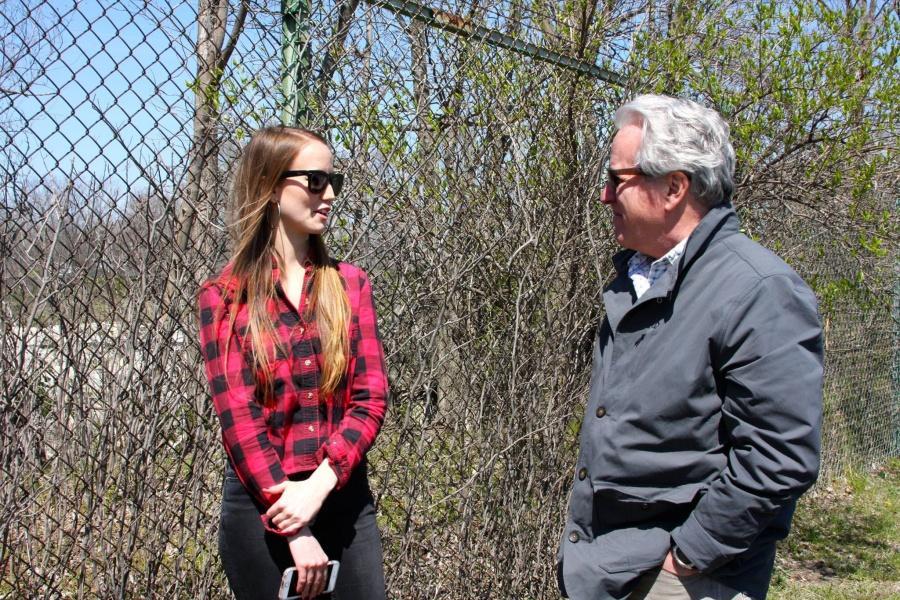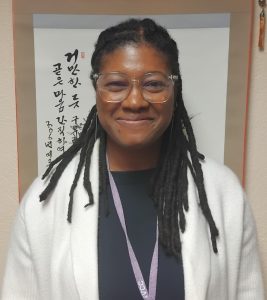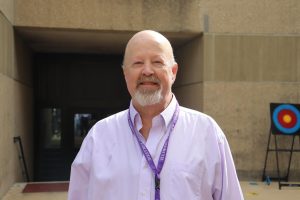Mr. President, it’s time for a clean air revolution
Former IVCC student Ashley Williams with “Dear President Obama” director Jon Bowermaster at U.S. Silica in Ottawa, the largest silica production facility in all of North America.
April 27, 2016
Former IVCC student Ashley Williams hosted a screening of the documentary “Dear President Obama, The Clean Energy Revolution is Now” on April 14, followed by a question and answer session with director Jon Bowermaster, at the Roxy Cinemas in Ottawa.
The documentary is a direct appeal to President Obama, calling on him “as he shapes his environmental legacy.” The first time President Obama addressed the environmental movement was at the 2012 State of the Union after his reelection. President Obama did not feel a pressing urgency to address climate change in the 2008 election, since there was no front on environmentalism and global warming.
“Few things have been more volatile during this president’s tenure than trying to blend our energy needs and climate future,” narrates Mark Ruffalo, Executive Director, actor and environmental activist. Seventeen million Americans live within a mile of new oil or gas wells, solidifying the impact that fracking has on the United States. The infrastructure of fracking sprawls across the country, and even states without fracking are feeling the impacts.
“Though the president has been proactive on climate change and the need to cut back on carbon emissions, oil and gas exploration and development has escalated under his administration,” Williams tells the IV Leader. “President Obama has touted natural gas as a bridge fuel to cleaner energy alternatives. This is simply not sustainable.”
As the beginning of his second term, President Obama relied on the notion that there was “100 years of natural gas” in the United States, comparing to the U.S. as Saudi Arabia. Realistically, the researchers behind the “100 years”idea were off by about 80 to 90 years, according to the film, since gas fields are already tapped.
Production in the oil industry is now greater than demand, causing prices to drop significantly and rigs to shut down. Those following the economic boom from fracking are now currently being laid off, unable to “chase the American Dream,” as one rig worker states in the film.
Every human has a need and use for natural energy resources such as the wind, sun and water. Scientists in the film believe that as we shift from the current 85 percent dependency on fossil fuels to a dependency of natural energy, prices decline along with the growth in the industry.
“What is required? A plan, a vision, a bold leader,” says Ruffalo. The natural gas industry is one of the largest in America, and those hoping to fight against it must have governmental backing.
“We are inviting President to stand with us, not by the sidelines,” adds Williams. “We want him to hear our stories, see our faces and feel our words.”
“Dear President Obama” gives an intimate look into the lives of the communities and victims of the fracking industry. Pennsylvania, Ohio, West Virginia and Texas have confirmed drinking water contamination due to fracking, a reality that the film addresses. Several community members across the nation are afraid to drink the water in their town, fearing the high levels of methane.
Ray, a resident of Pennsylvania, states in the film, “This place is spoiled now, all I want is my water back.” Others are unable to plant or tend to their gardens, since the soil is easily containable. The documentary also interviews those with injuries and illnesses related to the limited safety measures provided by fracking corporations. During “Dear President Obama,” one worker discusses being diagnosed with cancer as a result of a bucket of chemicals falling on his head during work at a rig.
“Fracking has been linked to groundwater and surface water contamination, air pollution, earthquakes, blowouts due to gas explosions and a myriad of health problems for humans and livestock,” says Williams.
Bowermaster and those involved with “Dear President Obama” hope that by providing these stories, policy makers, government officials and inspired citizens will work to make changes.
“It is their stories that will hopefully inform and hasten our moves toward a clean energy revolution,” states Ruffalo.
Although high-volume fracking is currently on hold in Illinois, communities are still being greatly affected. Northern White Sand, located in Utica, is a company that provides frack sand – a vital component to the process – to hydraulic fracking companies.
“You see there are parallels between our area and those documented in the film,” says Williams.
Northern White Sand has temporarily suspended their operations, due to “economic hardships.” Williams, calling Northern White Sand “chronic polluters,” says, “Anywhere in LaSalle County, you can find the dust.”
Mike Phillips, IVCC professor and College Democrats Advisor, recalls an instance in which Williams protested Northern White Sand. Williams contacted the local media, went out near Northern White Sand with a broom and dustpan and began sweeping the dust that had accumulated from the frack sand company.
“She understands the importance of getting issues out in a community,” says Phillips.
As Williams began increasing her commitment and knowledge on environmental policy, several local activists have partnered with her in the fight against fracking.
“If something like that is going to damage your lifestyle, you should have a say in it,” states Mary Whipple, secretary of Conserve Our Rural Ecosystem, or CORE, an organization in which Williams is currently a board member.
Williams graduated Summa Cum Laude at IVCC in spring 2015, and was awarded the F.W. Matthiessen Award for Academic and Civic Achievement. Williams was also named the 2015 New Century Scholar for Illinois, and a member of the 2015 All-USA Academic Team. During her time at IVCC, Williams was an active member of College Democrats, PTK and IV Sustainability.
After finding out about “Dear President Obama,” Jeff Claus, a retired professor at Ithaca College, frequent collaborator with John’s partner and early supporter of William’s work, notified Williams and connected her with Bowermaster, whose family is from Ottawa.
“Around the time Jon was concluding production on the film just a few months ago, he reached out and asked if I would be interested in hosting a screening in Ottawa,” says Williams. “I was beyond thrilled and said yes!”
After hosting a successful screening at the Roxy Cinemas, with a crowd of 129 people, Williams plans to help Bowermaster organize other screenings in the Midwest. “Dear President Obama” will be available for public viewing in two to three months, according to Bowermaster.
As a way to enact change and gain governmental support, Bowermaster and his team are sending copies of “Dear President Obama” to the department of natural resources, state health commissioners, presidential candidates and the White House.
Editor’s note: The print edition of the IV Leader states that Northern White Sand is on restrictive permits, while in fact, they have temporarily suspended all operations. The photo is also located at U.S. Silica in Ottawa, the largest silica production facility in North America.





Jeff Claus • Apr 28, 2016 at 10:18 am
Thanks for a good article about this event and the important issues the film addresses. Thanks, also, to Ashley Williams, Jon Bowermaster, Mark Ruffalo, and so many others in the film who are bringing critical stories, research, and information to bear on the often harmful practice of fracking.
I noticed my name in the piece, too, and just thought I’d add that I grew up in Ottawa as well. I currently live in Ithaca, NY, where my wife and I have been very active in the anti-fracking and pro-sustainable energy movements that have led to a statewide ban here on fracking and substantial supports for solar and wind. My wife and I also contributed music to the film, Dear President Obama.
I hope Illinois won’t suffer the way so many fracked states have, and that citizens there will continue to push back against the practice and in favor of more efficient and human friendly sources of energy.